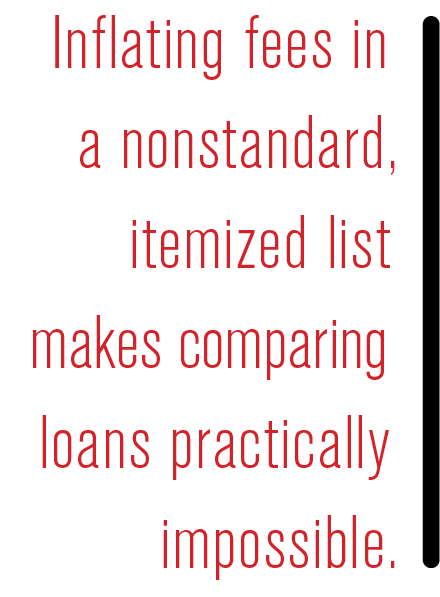By Yatin Karnik, Founder and CEO, Confer, Inc.
If you want to help your clients and take your real estate business to the next level, become an expert on something homebuyers are clamoring to learn about: junk fees. Banks and lending participants are using hidden and confusing fees to defraud your clients.
What are junk fees?
Junk fees are itemized charges tacked on to the closing cost by the lender. If lenders wanted to make the process convenient and easy to understand, they would consolidate these fees into one lump sum.
Some fees can’t be consolidated because they are either dependent on the time of the closing or are deductible. These include:
- Points — a percent of the loan and part of the cost of credit
- Escrow — payments to fund an account from which the lenders will pay your buyer’s taxes and insurance
- Per diem interest — interest from the closing date to the first day of the following month.
The remaining charges are called junk fees and appear on closing statements under many names.
Why are junk fees so confusing?
The term junk fees is confusing because it leads buyers to believe they shouldn’t be in the closing costs at all. Many lenders pad these fees to make additional money, but that isn’t the biggest reason these fees are bad.
 Junk fees are controversial because lenders do not offer information about them early in your buyer’s home-shopping process. Lenders do not standardize or explain them. Worst of all, lenders reserve the right to change them right up to your buyer’s closing date. Some fees allow up to 10% of variation. However, new fees can be added if there is valid change circumstance. But does your buyer understand if it was a valid change? That’s where fees can surprise you at the closing table.
Junk fees are controversial because lenders do not offer information about them early in your buyer’s home-shopping process. Lenders do not standardize or explain them. Worst of all, lenders reserve the right to change them right up to your buyer’s closing date. Some fees allow up to 10% of variation. However, new fees can be added if there is valid change circumstance. But does your buyer understand if it was a valid change? That’s where fees can surprise you at the closing table.
Why do some lenders itemize these additional fees and others don’t? Their goal is to confuse and distract your buyers. If they present a long, detailed list itemized in a different way than other local lenders, it is difficult to compare one loan to another.
In addition, these fees are not locked. When most lenders lock your buyer’s interest rates, they guarantee the interest rate and points, but they don’t provide an accurate total of junk fees. The official loan estimate is just that—an estimate. Again, the protections provided by the Real Estate Settlement Procedures Act (RESPA) can easily be twisted with valid change definition.
What to do about junk fees
Steer your buyers to lenders who consolidate junk fees and lock the total, so there are no surprises on closing day. Most lenders will agree to this if you are in the process of shopping for homes.
Even when banks and lenders estimate fees upfront, they typically inflate the fees making up the total. Padding these numbers protects banks but dilutes the official loan estimate’s importance because buyers are unable to know the exact fees to expect. Inflating fees in a nonstandard, itemized list makes comparing loans practically impossible. It also bucks the intent of the law that brought previous residential laws under the Consumer Financial Protection Bureau and condensed previous HUD documents into the loan estimate and closing disclosure.
If your buyers have asked you for pointers on negotiating junk fees, advise them to let the mortgage company, mortgage broker and title agent know they will not pay padded closing costs and will request receipts to verify charges for outside services such as wire transfers, courier charges, copier fees, mail fees, certificate searches or deed recording. Advise buyers to bring their loan estimate document as well as closing disclosure to the closing to dispute additional charges that appear.
There is no way to eliminate junk fees entirely, but you can help buyers minimize them. Watch for excessive processing and documentation fees in these areas:
- Application fee
- Mortgage rate lock fee
- Return to float fee
- Underwriting fee
- Broker rebate
- Loan processing fee
These fees and others can be negotiated. Sometimes just asking about a fee will result in that charge being reduced or even eliminated.
The best thing you can do for your buyers is to learn the lingo concerning junk fees and help them shop for lenders early. Also make sure to advise them that the burden is upon the lender to prove it was a valid change circumstance for a fee to have increased. Do not hesitate to demand clarity.
Knowing what basic financing programs are available will help agents better represent their clients. For more information, watch “Financing with Confidence,” presented by Pat Zaby, CRS, at CRS.com/webinars.
Photo: iStock.com/Grandbrothers








